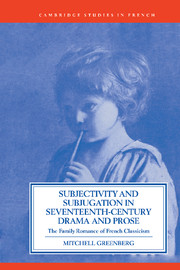 Subjectivity and Subjugation in Seventeenth-Century Drama and Prose
Subjectivity and Subjugation in Seventeenth-Century Drama and Prose Book contents
- Frontmatter
- Contents
- Preface
- Introduction
- 1 L'Astrée and androgyny
- 2 The grateful dead: Corneille's tragedy and the subject of history
- 3 Passion play: Jeanne des Anges, devils, hysteria and the incorporation of the classical subject
- 4 Rodogune: sons and lovers
- 5 Molière's Tartuffe and the scandal of insight
- 6 Racine's children
- 7 “Visions are seldom all they seem”: La Princesse de Clèves and the end of Classical illusions
- Notes
- Index
- Cambridge Studies in French
5 - Molière's Tartuffe and the scandal of insight
Published online by Cambridge University Press: 16 October 2009
- Frontmatter
- Contents
- Preface
- Introduction
- 1 L'Astrée and androgyny
- 2 The grateful dead: Corneille's tragedy and the subject of history
- 3 Passion play: Jeanne des Anges, devils, hysteria and the incorporation of the classical subject
- 4 Rodogune: sons and lovers
- 5 Molière's Tartuffe and the scandal of insight
- 6 Racine's children
- 7 “Visions are seldom all they seem”: La Princesse de Clèves and the end of Classical illusions
- Notes
- Index
- Cambridge Studies in French
Summary
Alors, le regard cherche, nous regardons de tous nos yeux dans le seul but de, enfin, ne plus voir, mais être.
Car si le visible ne s'épuise ni en une visée transcendente, ni en une pensée proximale d'un espace partes extra-partes s'il est prégnant de l'invisible, “Voir c'est ne plus être.” … plus on voit, moins on est, plus on est moins on voit.
Unquestionably Le Tartuffe is Molière's most scandalous comedy. From its creation at Versailles as part of the royal festivities known as the “Plaisirs de l'Ile Enchantée” in May of 1664 to its withdrawal from the stage and the royal government's refusal to allow its public performance for a period of several years, the play, in its different versions, ignited a debate rarely paralleled in the annals of the French stage. During the period of its prohibition, Molière, his supporters and enemies engaged in heated controversy over the real or imagined attack on piety and “dévots,” and over the social, moral and ethical role of the theater in society. Until its rehabilitation in 1669, the play, perhaps more than any other of the seventeenth century, generated a dizzying whirlwind of charges and countercharges that clearly situates it as the focal point of an entire epistemological dilemma, of a sensitive, overly charged threat to all social order, to, even (if we listen to the ravings of Pierre Roullé) the invasion of the well-ordered world of ecclesiastical and monarchal order by the “satanic”: Molière was accused of being “un démon vêtu de chair et habillé en homme…”
- Type
- Chapter
- Information
- Subjectivity and Subjugation in Seventeenth-Century Drama and ProseThe Family Romance of French Classicism, pp. 113 - 140Publisher: Cambridge University PressPrint publication year: 1992


